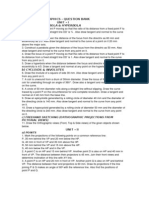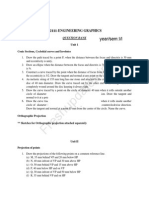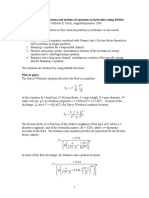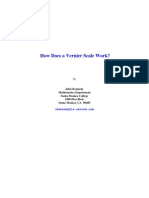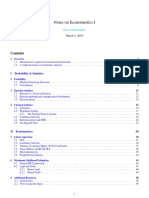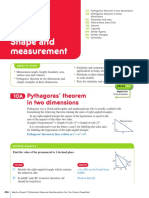0 ratings0% found this document useful (0 votes)
0 viewsAssignment II
The document outlines assignments for a Computer Aided Engineering Graphics course, focusing on the projection of solids and sectioning of solids. It includes specific tasks involving various geometric shapes such as hexagonal prisms, square pyramids, cylinders, and tetrahedrons, requiring students to draw projections and sectional views based on given conditions. Each assignment specifies dimensions and orientations for accurate representation in engineering graphics.
Uploaded by
adhithya01036Copyright
© © All Rights Reserved
Available Formats
Download as DOCX, PDF, TXT or read online on Scribd
0 ratings0% found this document useful (0 votes)
0 viewsAssignment II
The document outlines assignments for a Computer Aided Engineering Graphics course, focusing on the projection of solids and sectioning of solids. It includes specific tasks involving various geometric shapes such as hexagonal prisms, square pyramids, cylinders, and tetrahedrons, requiring students to draw projections and sectional views based on given conditions. Each assignment specifies dimensions and orientations for accurate representation in engineering graphics.
Uploaded by
adhithya01036Copyright
© © All Rights Reserved
Available Formats
Download as DOCX, PDF, TXT or read online on Scribd
You are on page 1/ 2
Assignment II
24GE201 COMPUTER AIDED ENGINEERING GRAPHICS
UNIT III PROJECTION OF SOLIDS
6. A hexagonal prism of 30 mm base edges and axis 70 mm long rests on one of its
corners of base n HP. Draw its projections, when the lateral edge through that corner
on HP is inclined at 30° to HP and the vertical plane containing that lateral edge and
the axis is parallel to VP.
7. A square pyramid of base 30 mm and height 60 mm is suspended by means of a
string from one of its base corners with its axis parallel to VP. Draw its projections
8. A square pyramid of side of base 40 mm and axis 60 mm long has a triangular
face in the VP. Draw the projection of the pyramid if the axis is parallel and 25 mm
above HP.
9. A hexagonal prism with base side 30mm and axis length 70mm is resting on HP
on one of its base corners with solid diagonal through that corner is perpendicular to
HP. Draw it's projections.
10. A Pentagonal Pyramid of base edge 30mm and axis length 60mm rests on the
HP on one of its base edge on HP Such that the highest base corner is 20mm above
HP. Its axis is parallel to the VP. Draw its top and front views.
UNIT IV SECTION OF SOLIDS AND DEVELOPMENT OF SURFACES
1. A hexagonal prism of base side 30 mm and axis length 60 mm is resting on HP on
one of its bases with two of the vertical faces perpendicular to VP. It is cut by a plane
inclined at 50° to HP and perpendicular to VP and passing through a point at a
distance 12 mm to the top base. Draw its front view, sectional top view and true
shape of section.
2. A cylinder of base diameter 45 mm and height 65 mm rests on its base on HP. It is
cut by a plane perpendicular to VP and inclined at 30 ° to HP and meets the axis at a
distance 30 mm from base. Draw the front view, sectional top view, and the true
shape of section.
3. A cube of 60 mm side has is base edges equally inclined to VP. It is cut by a
sectional plane perpendicular to VP, so that the true shape of cut section is a regular
hexagon. Locate the plane and determine the angle of inclination of the VT with the
reference line XY. Draw the sectional top view.
4. A cone of base diameter 60 mm and axis length 70 mm is resting on HP on its
base. It is cut by a plane perpendicular to VP and parallel to a contour generator and
is 10 mm away from it. Draw the front view, sectional top view and the true shape
section.
5. A tetrahedron of side 60 mm in resting on HP on one of its faces. It is cut by a
plane perpendicular to the VP, so that the true shape of cut section is a triangle of
base 40 mm and altitude 30 mm. Locate the plane and determine the angle of
inclination of the VT with the reference line XY. Draw the sectional top view and true
shape of section.
You might also like
- Designations Congruent With Thi - CleanwhiteroomNo ratings yetDesignations Congruent With Thi - Cleanwhiteroom487 pages
- Question Bank For Test 2 - (Unit 3 and Unit 4)No ratings yetQuestion Bank For Test 2 - (Unit 3 and Unit 4)4 pages
- Section of Solids Questions For PracticeNo ratings yetSection of Solids Questions For Practice4 pages
- Anna University Engineering Graphics Question BankNo ratings yetAnna University Engineering Graphics Question Bank8 pages
- Engineering Graphics - Question Bank Unit - I A) Ellipse, Parabola & HyperbolaNo ratings yetEngineering Graphics - Question Bank Unit - I A) Ellipse, Parabola & Hyperbola6 pages
- Engineering Graphics Module I To VI TutorialsNo ratings yetEngineering Graphics Module I To VI Tutorials10 pages
- Kings: Department of Mechanical EngineeringNo ratings yetKings: Department of Mechanical Engineering11 pages
- 22ME160-Engg Graphics Worksheet 6 - 2023-24No ratings yet22ME160-Engg Graphics Worksheet 6 - 2023-241 page
- Anna University Engineering Graphics Question Bank Unit1 Unit5No ratings yetAnna University Engineering Graphics Question Bank Unit1 Unit57 pages
- UNIT 5 CONCISE Q A Sections of Solids and Development of SolidsNo ratings yetUNIT 5 CONCISE Q A Sections of Solids and Development of Solids9 pages
- UNIT 06 Development of Lateral Surfaces Question BankNo ratings yetUNIT 06 Development of Lateral Surfaces Question Bank2 pages
- SBM College of Engineering and Technology, Dindigul-5 Engineering Graphics-I Year (2012-13) Sectioning of SolidsNo ratings yetSBM College of Engineering and Technology, Dindigul-5 Engineering Graphics-I Year (2012-13) Sectioning of Solids4 pages
- Engineering Graphics II Answer Any Five Questions 5 X 20 100No ratings yetEngineering Graphics II Answer Any Five Questions 5 X 20 1001 page
- Geethanjali Institute of Science & Technology: NelloreNo ratings yetGeethanjali Institute of Science & Technology: Nellore2 pages
- The Quick & Easy Triangle Block Tool: Make 100 Triangle, Diamond & Hexagon Blocks in 4 Sizes with Project Ideas; Packed with Hints, Tips & Tricks; Simple Cutting Charts, Helpful Reference TablesFrom EverandThe Quick & Easy Triangle Block Tool: Make 100 Triangle, Diamond & Hexagon Blocks in 4 Sizes with Project Ideas; Packed with Hints, Tips & Tricks; Simple Cutting Charts, Helpful Reference TablesNo ratings yet
- MATLABSIMULINK Based Model of Single Machine PDFNo ratings yetMATLABSIMULINK Based Model of Single Machine PDF10 pages
- Counting in Two Ways - Paul Valiant - MOP (Blue) 2011No ratings yetCounting in Two Ways - Paul Valiant - MOP (Blue) 20112 pages
- Sigmoid Function - From Wolfram MathWorldNo ratings yetSigmoid Function - From Wolfram MathWorld3 pages
- Notes On Econometrics I: Grace MccormackNo ratings yetNotes On Econometrics I: Grace Mccormack50 pages
- 1.write A Program To Print ' 100 Times Using Linefeed and Carriage Return. CodeNo ratings yet1.write A Program To Print ' 100 Times Using Linefeed and Carriage Return. Code7 pages
- Demand Forecasting & Collaborating Planning, Forecasting & ReplenishmentNo ratings yetDemand Forecasting & Collaborating Planning, Forecasting & Replenishment13 pages
- Acoustic Wave Propagation in Buried Iron Water PipesNo ratings yetAcoustic Wave Propagation in Buried Iron Water Pipes22 pages












